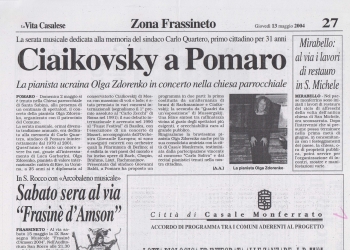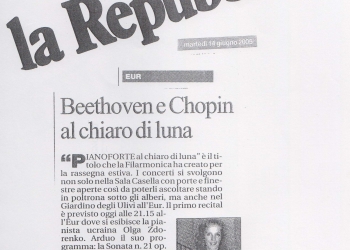
“...interprete sensibile e profonda,la Zdorenko si è imposta per la nitidizza del tocco ed il temperamento artistico in un repertorio sufficientemente vasto che spazia dal barocco (Bach e Domenico Scarlatti) sino al Novecento ed ai compositori compresi i russi passando per la congeniale stagione romantica.Tecnica ed espressione vanno congiunti nelle sue interpretazioni in cui reca il contributo della sua anima slava.A testimonianza di un interprete al contempo comunicativa e raffinata.”
Lorenzo Tozzi–Il tempo-6/2006
“...l'attenzione per i dettagli,la cura ed il controllo del suono,l'amore per la chiarezza e la trasparenza del discorso musicale caratterizzano la sua ricerca dell'essenza poetica chopiniana.Questa appassionata generosità nello svelare le gemme del testo musicale e l'elegante sobrietà del suo gesto d'approccio allo strumento donano alle sue interpretazioni un'umanità,una sincerità ed uno slancio vitale che emozionano e conquistano l'uditorio.”
Luca Garbarini-Il Piccolo
“La bellezza che dialoga con lo spirito.”
“...bellezza che la stessa interprete regalava al pubblico.
La dote filiforme del patrimonio fisico ed il portamento della bella maestra ucraina,avvolta dal suo candore biancogeno,dava un risalto aggiuntivo,di eleganza e classe...”
Rocco D.Alberti
“...la prima parte del concerto è stata resa luminosa ed intensa da una vera e propria regina del pianoforte,l'artista russa,di fama mondiale,Olga Zdorenko.Bionda e sinuosa,bella oltre che bravissima,cinta da un vestito nero,Olga ha emozionato e strabiliato suonando il piano quasi per magia,con ricercatezza,grazia,vis intimistica,altissima perizia tecnica.
Olga Zdorenko si è esibita in parabole d'ineffabile melodiosità “sopra” all'orchestra che a dir poco l'ha accarezzata.Il climax dell'esecuzione è stato raggiunto nel rondò finale suonato con maestosità e freschezza.Al termine del primo tempo del concerto Olga è stata applaudita da una platea così entusiasta da indurla a rientrare in scena per ben tre volte di fila,esibendosi in tre “stacchi pianistisci” eseguiti con patos e perfezione,quasi metafisici.”
Mariangela Petruzzelli-Gazzetta del Mezzogiorno
“...la pianista ha dato prova di una superlativa padronanza tecnica,oltre ad un tocco perlato,quasi chopiniano.”
“...seconda parte dedicata ai “Quadri”,un'opera molto inflazionata che la Zdorenko ha però reso in modo del tutto inusuale: senza soluzione di continuità fra un brano e l'altro e poi con una versione tutta particolare della Promenade,non marziale,secca,ridondante,come è capitato molto spesso di sentire,ma dolce,smussando asprezze e con dei piani e delle delicatezze del tutto insolite.”
Alberto Ricci-La Stampa
“...è stata un'esecuzione intensa,estrosa,a tratti incandescente,una sincera manifestazione delle origini russe dell'interprete.
L'altissimo impegno tecnico richiesto da un simile programma,se da un lato ha esaltato le doti virtuosistiche della Zdorenko d'altro canto ha soprattutto permesso di apprezzare le doti espressive: anche nel più virticoso turbinio di note,infatti,la chiarezza del discorso musicale ed il controllo del suono non sono mai venuti meno.La cura per il dettaglio è così organica alla visione generale che,ad esempio,ascoltando Rachmaninov,si aveva l'impressione di gettare lo sguardo su di un corso d'acqua,ora calmo,ora impetuoso,ma di cui si potevano sempre distinguere le pietre preziose sparse sul fondale.”
Luca Garbarini-Il Piccolo
“...Olga esprime,suonando,candore e romanticismo.Si direbbe uscita dalle pagine di un libro dell'Ottocento.Ha uno splendido senso del ritmo ed è riuscita a cogliere il carattere insolitamente sereno del concerto.Attenta alle inflessioni liriche della scrittura sfoggiava una tecnica virtuosa consumata; ora leggerissima,ora quasi malinconica nei poderosi accordi.
Nel finale ha dispiegato tutta la sua brillante luminosità virtuosistica.”Brava”,gradavano i più enstusiasti,”bis!”.Ma lei,giovanilmente emozionata,anzichè concedere il Valzer di Chopin preparato fuori programma,ha chiamato accanto a sé il suo papà perchè lo applaudessero insieme a lei.”
Mya Tannenbaum-Corriere della Sera-Settembre '92
“...Tant'è che dobbiamo limitarci a parlare quasi solo della pianista,longilinea,bionda,che ha dimostrato coraggio e qualche cosa in più,fortunatamente: due belle mani dallo stile agile ed ampio,un tocco cristallineo,un'anima penetrata,una grande forza mascolina con tecnica forbita e fluidità di fraseggio,oculato uso di pedale,senso romatico e spiccato dei risvolti sentimentalistici (Adagio del Concerto) di calcata melodia.Se l'è cavata qui con grazia e altrove con polso atto a dimostrare piena destrezza nel superare le impervie difficoltà della scrittura pianistica.”
Renzo Bonvicini-Repubblica
“...il pubblico che gremiva la Sala comunale dei concerti le ha,infatti,tributato un caloroso successo,calorosità ricompensata con due bis: il toccante Studio op.25 n°7 di Chopin ed una esecuzione del preludio in Sol minore di Rachmaninov piena di energia,vitalità ed estro tipicamente russi.”
Luca Garbarini-La Voce
“...Gli occhi azzurri e penetranti seguono con attenzione lo spartito,le mani corrono agili e veloci sulla tastiera in un continuo inseguimento l'una dall'altra; è questa l'immagine di Olga Zdorenko,pianista russa che vive in Italia,che domenica sera al Teatro Pirandello di Messina,su invito dell'Azienda di soggiorno e turismo,ha regalato all'attento pubblico un pomeriggio di grande musica.
Leggera e incisiva nello stesso tempo Olga Zdorenko,domenica sera ha eseguito la Partita n°2 di Bach,Sonata op.22 di Beethoven,Notturno,Mazzurca e Scherzo n°3 di Chopin.Chiari di Luna e Fuochi d'Artificio di Debussy;e per chiudere con la Fantasia Betica di De Falla.”
Giuseppe Zingari-La Sicilia
“...applaudita anche la Zdorenko che ha proposto uno stuolo di Preludi di Rachmaninov,ora umorali ora percussivi e trasognati,poi il criptico Skriabin (Studio dell'op.2 e la granitica sonata n°5).In tema gli applauditi bis: l'appassionata Elegia di Rachmaninov e l'estroso Rondò di Kabalevsky.”
Lorenzo Tozzi-Il Tempo-Lug 2001

“...the first part of the concert became luminous and intense by a real queen of the piano, the world famous Russian artist, Olga Zdorenko. Blonde and sinuous, beautiful as well as talented, dressed in black, Olga excited and amazed, playing the piano as if by magic, with refinement, grace, intimacy, and a high level of technical skill.
Olga Zdorenko performed at the height of inexpressible melodiousness “above” the orchestra, which, to say the least, was caressed by her playing.. The climax of the exhibition was reached in the final rondo which was played with majesty and freshness. At the end of the first act of the concert, Olga was applauded by an audience so enthusiastic she was persuaded to return three times to play “three piano intervals” executed with pathos and perfection, almost metaphysical.”
Gazzetta del Mezzogiorno
“Olga expresses candor and romanticism, while playing,. It might be said, directly out of a book of the 1800’s. She has a splendid sense of rhythm and was able to extract the unusually serene character of the concert. Attentive to the lyrical inflections of the piece, she displayed a consummate technical virtuosity; at times very light, at others melancholic with powerful chords. In the finale, she displayed all her brilliant and luminous virtuosity. The more enthusiastic shouted “brava” and “encore!”. But, youthfully moved, instead of conceding the Chopin Waltz which she prepared, she called her father to be next to her to accept the applause together.”
Corriere della Sera
“…We must limit ourselves to talk almost only of the pianist, long-limbed and blonde, who demonstrated not only courage but something more, fortunately: two beautiful hands, agile and extensive, a crystalline touch, a penetrating spirit, a great masculine strength, a refined technical ability, fluid phrasing, prudent use of the pedal, distinct romantic sense in the sentimental aspects (Adagio del Concerto) of the pressing melody. She succeeded at times with grace and other times with the strength to demonstrate her accomplished skill in overcoming the inaccessible difficulty of the piano score.”
La Repubblica
“…also applauded was Zdorenko who proposed a group of Rachmaninov Preludes, at times humourous, at others percussive and day-dreamy, and then the cryptic Skriabin (Studio of op.2 and the unyielding sonata n. 5. Keeping with the theme, were the applauded encores: the passionate Elegia by Rachmaninov and the fanciful Rondò by Kabalevsky.”
Il Tempo
“Her blue, penetrating eyes followed the score with attention, her hands ran nimbly and quickly along the keyboard in continuous pursuit of each other. This is the image of Olga Zdorenko, the Russian pianist who lives in Italy. She was invited by the Azienda of residence and tourism to play at the Pirandello Theatre of Messina, and gave an attentive public a Sunday afternoon of great music.
Sunday evening, light and incisive at the same time, Olga Zdorenko played la Partita n.2 of Bach, Sonata op.22 of Beethoven, Notturno, Mazzurca and Scherzo n.3 by Chopin, Chiari di Luna and Fireworks by Debussy; and closing with La Fantasia Betica by De Falla.”
La Sicilia
“...The pianist gave proof of a superlative technical mastery, beyond a pearlescent touch, almost Chopin-like.”
“…the second part was dedicated to “Quadri”, a very inflated work which Zdorenko performed in a most unusual way: without solutions of continuity between one song and another and then a very particular version of the Promenade, not military, dry, redundant, as it is very common to hear, but sweet, smoothing the sharpness with gentleness and delicacy in an out of the ordinary way.”
La Stampa
“…the attention to the details, the care and control of the sound, the love for the clarity and transparency of the musical discourse characterized her research for the poetic chopinian essence.
This passionate generosity to reveal the gems of the musical score and the elegant sobriety of her approach to the instrument give her interpretation a humanity, a sincerity and a vital impulse that brings emotion and conquers the listener.”
Il Piccolo
“…the public that packed the communal hall of the concert, in fact, paid tribute with a hearty applause, a warmth that was repaid with two encores: the touching Studio op.7 of Chopin and an execution of the prelude in sol minor of Rachmaninov full of energy, vitality and talent typically Russian.”
La Voce
“…it was an intense and talented execution, at times incandescent, a sincere manifestation of the Russian origin of the interpreter.
The extremely high technical commitment required of a program of this type, on one side, brought out the virtuistic talent of Zdorenko and above all, from another side, allowed for the appreciation of her expressive ability: even in the most whirling turbine of notes, in fact, the clarity of the musical discourse and the control of the sound were always consistent. The attention to detail is so organic to the general vision that, for example, listening to Rachmaninov, one had the impression of viewing a course of water, now calm, now impetuous, but in which one could always distinguish the precious stones scattered on the bottom.”
Il Piccolo
“…a sensitive and profound interpreter, Zdorenko performs with a clarity of touch and an artistic temperament in a sufficiently vast repertoire that goes from baroque (Bach and Domenico Scarlatti) to 1900 and the composers including the Russians passing through the congenial romantic season. Technique and expression are joined in her interpretation which contains the contribution of her Slavic spirit, bearing witness to an interpreter both communicative and refined.”
Il Tempo























